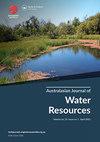西澳大利亚西南部干旱气候下的水资源规划
IF 2.2
Q2 WATER RESOURCES
引用次数: 1
摘要
摘要当气候变化显著减少西澳大利亚西南部的径流量和补给时,水资源开发水平并没有达到临界水平。这是因为该州人口相对较少,灌溉业规模较小(主要以自给地下水为基础),第二产业水平较低。尽管需要大幅降低供水系统的费率,但很少有资源被严重超额分配。西澳大利亚州西南部强烈的单向干燥信号是一个优势,因为随着条件的持续干燥,已经开发了新的供水和/或减少了需求,从而加强了所做的决定。通过加快和替代水源开发,政府在适应西南部干燥气候方面发挥了强有力的领导作用,在减轻可怕影响方面取得了极大成功,尤其是在珀斯-皮尔地区。然而,随着干旱和变暖趋势的持续,开发新水源的机会越来越少,需要考虑更广泛的水源,特别是在水资源规划中的使用。更细致的规划需要更强有力的治理环境和更多利益相关者的参与。未来几年可以通过新的立法,逐步改变水资源规划和管理的治理和复杂性。本文章由计算机程序翻译,如有差异,请以英文原文为准。
Water resources planning in a drying climate in the south-west of Western Australia
ABSTRACT The level of water resource development was not at a critically high level when climate change dramatically reduced runoff and recharge in South-west Western Australia. This was because of the state’s relatively low population for its size, a small irrigation industry (mainly based on self-supply groundwater) and the low level of secondary industry. Few resources were heavily over allocated despite the need to significantly de-rate water supply systems. The strong uni-directional drying signal in the south-west of WA has been an advantage in that new water supplies have been developed and/or demands reduced as conditions continued to dry, reinforcing the decisions made. Strong government leadership in adapting to a drying climate in the south-west, through accelerated and alternate water source developments has been extremely successful in mitigating dire impacts, especially in the Perth-Peel region. However, as drying and warming trends continue, there is less opportunity to develop new sources and a need to consider a wider array of sources, especially use in water resource planning. More nuanced planning requires stronger governance settings and increased engagement of stakeholders. A step change in the governance and sophistication of water planning and management could be achieved through new legislation in coming years.
求助全文
通过发布文献求助,成功后即可免费获取论文全文。
去求助
来源期刊

Australasian Journal of Water Resources
WATER RESOURCES-
CiteScore
5.10
自引率
21.90%
发文量
25
期刊介绍:
The Australasian Journal of Water Resources ( AJWR) is a multi-disciplinary regional journal dedicated to scholarship, professional practice and discussion on water resources planning, management and policy. Its primary geographic focus is on Australia, New Zealand and the Pacific Islands. Papers from outside this region will also be welcomed if they contribute to an understanding of water resources issues in the region. Such contributions could be due to innovations applicable to the Australasian water community, or where clear linkages between studies in other parts of the world are linked to important issues or water planning, management, development and policy challenges in Australasia. These could include papers on global issues where Australasian impacts are clearly identified.
 求助内容:
求助内容: 应助结果提醒方式:
应助结果提醒方式:


